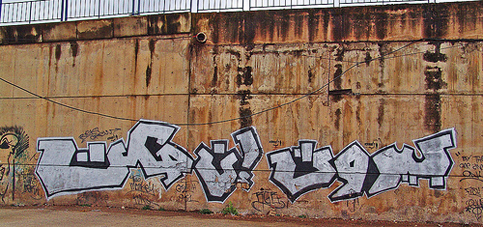- Montreal Mirror by Narcel X.

- Photo: “If Beirut could speak…”
If you’ve ever been to Lebanon, you know that people don’t read road signs there. Beirut hip hop duo Aks’ser—Arabic for “opposing traffic”—follow that tradition, but refuse to crash anyone else’s party. With Arabic hip hop paving its lane in the international music scene, there’s no denying members Wael Kodeih and Houssam Fathallah (aka Rayess Bek and Eben Foulen), with their former producer Tarek Yamani, their rightful seat among its pioneers. They’re chauffeuring the modern identity crisis to its crossroads at 1,000 miles an hour, hoping to steer the condition of their people in a new direction. The Mirror caught up with Bek in advance of their Festival du Monde Arabe appearance.
Mirror: Why did you call your group Aks’ser?
Rayess Bek: One of the reasons is musical. When we created the group in 1996, nobody was rapping in Arabic in the Middle East. The only available music was bubblegum pop. We wanted to go against the grain. The other is in reference to our people’s driving.
Mirror: How was it, making music in Lebanon during times of war? Was it an influence on your music at all?
Rayess Bek: We make concrete music, so we don’t sell you dreams at all. It’s about real life in a real country influenced by the war. Every single person who lived through war has the need to share this experience with people.
My generation grew up in bunkers. This is a way to deal with it.
Mirror: How come you choose a sarcastic approach to your message?
Rayess Bek: Making Arabic hip hop in the Arab world is extremely difficult. You have to deal with the legal side of things, censorship and public acceptance. Then you have to deal with the religious aspects of society, the media and lastly, the customs of our culture. To reach people, we chose to be sarcastic, but not all the time. We don’t take sides—we don’t want to play that game that leads to civil war. How can our music “sound” Lebanese when the Lebanese themselves are still searching for their identity?
Mirror: What do you think of the present state of hip hop?
Rayess Bek: Today, the image of hip hop is very bad. I like to call it “capitalist hip hop” because it is so materialistic and misogynistic. With the eventual meltdown of big industry and the rise of alternative media, music is becoming free, and this is where hip hop will be reborn. That’s where we come in as Arab artists, from the underground up.
Mirror: What is the difference between your solo projects and the group project?
Rayess Bek: Our solo projects are obviously more personal. I am working more on orchestral music, with real instruments on stage. I like to deconstruct the typical hip hop rhythm with Arabic music. As for the lyrics, it can sometimes be very dark and not intended to be listened to by everybody.
Mirror: A lot of your imagery has to do with your assassination—is this a metaphor for the way the system sees Arabs and hip hop artists?
Rayess Bek: In many songs, we play the roles of journalists, politicians—we treat the music like theatre. So many assassinations have happened in Lebanon, and I believe us artists are not excluded from that danger.
with Nomadic Massive at La Sala Rossa, Sunday, November 2nd, 8pm, 17$.


